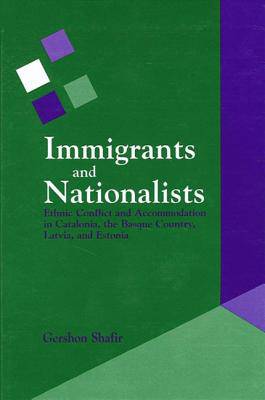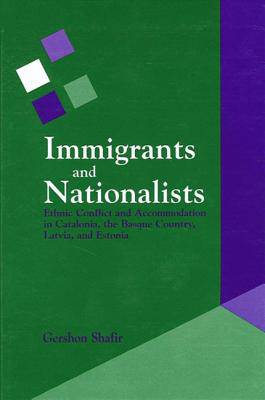
- Retrait gratuit dans votre magasin Club
- 7.000.000 titres dans notre catalogue
- Payer en toute sécurité
- Toujours un magasin près de chez vous
- Retrait gratuit dans votre magasin Club
- 7.000.000 titres dans notre catalogue
- Payer en toute sécurité
- Toujours un magasin près de chez vous
Immigrants and Nationalists
Ethnic Conflict and Accommodation in Catalonia, the Basque Country, Latvia, and Estonia
Gershon Shafir
Livre relié | Anglais
145,45 €
+ 290 points
Format
Description
Recent years have witnessed a swell of intense opposition to immigration in the developed world. In this empirical and theoretical study of nationalism, ethnicity, immigration, and internationalism, Gershon Shafir examines and compares the reception of large numbers of immigrants to four regions at opposite ends of Europe that are relatively overdeveloped but that at the same time possess distinct cultures and nationalist movements of their own: Catalonia and the Basque Provinces in Spain and the Republics of Latvia and Estonia on the Baltic. What makes the comparison of these regions illuminating is the divergence, and reversals, in the policies and attitudes adopted by their nationalist movements during the past century. This study shows that immigrants' attitudes toward integration into their host societies cannot explain the divergence in the nationalists' positions toward them. The imbalance between the immigrants' readiness to integrate into their new societies and the measure of the nationalist opposition indicates that the causes of anti-immigrant hostility are usually found among the hosts. Shafir argues that hostility toward immigrants in developed regions is rooted not in the threat of "denationalization" or economic competition but in the danger they pose to the privileges of traditional and modern political elites, who transform regional nationalist sentiments into anti-immigration movements.
Spécifications
Parties prenantes
- Auteur(s) :
- Editeur:
Contenu
- Nombre de pages :
- 279
- Langue:
- Anglais
Caractéristiques
- EAN:
- 9780791426739
- Date de parution :
- 06-10-95
- Format:
- Livre relié
- Format numérique:
- Genaaid
- Poids :
- 562 g







